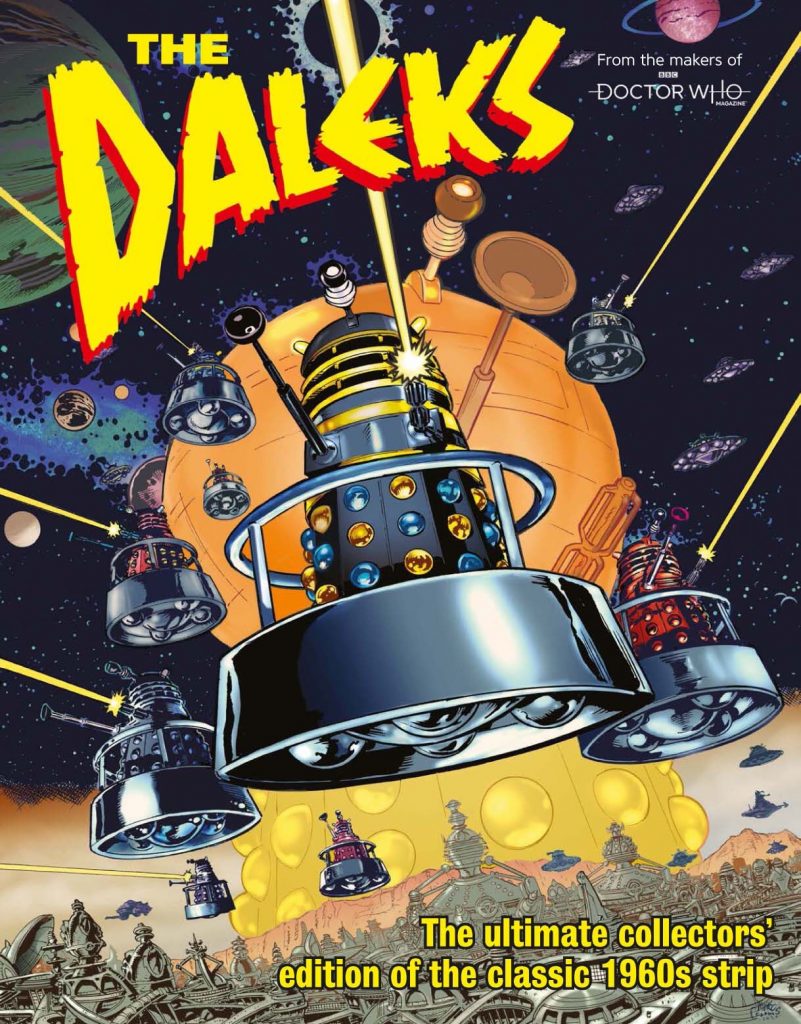
The ultimate collectors’ edition of the classic 1960s strip The Daleks is on its way from Doctor Who Magazine.
First published in TV Century 21 from 1965 to 1967, “The Daleks” was devised by Terry Nation and, it is widely asserted, largely written by Doctor Who’s first story editor David Whitaker.
For this collectors’ edition, all 104 instalments have been digitally restored – the vast majority from the original artwork.

The bookazine also includes new features about the writers, illustrators and publishers who created “The Daleks”, including a detailed interview with one of its artists, Ron Turner; and a behind the scenes insight into the work that went into the presenting the pages in their best light.
Editor Marcus Hearn says: “This is the fulfilment of a long-held ambition. I loved this strip as a child and now – having seen the stunning restoration by DWM art editor Peri Godbold and her team – I admire it even more. You can’t really say ‘The Daleks’ has been restored to its former glory, because I think it now looks better than it’s ever looked before.”
• The Daleks is on sale at WH Smith, selected supermarkets and online at store.panini.co.uk from Wednesday 11th November priced £9.99 (UK) | ISBN 9781846532771 | Direct Link
• It’s also available as a digital edition, priced £8.99, from pocketmags.com
• You can order The Daleks from ForbiddenPlanet.com here – on sale in store from 18th November 2020 (Affiliate Link)
• Online single issue and subscription site Newsstand offers The Daleks Bookazine here – but as of Saturday 14th November 2020, note the “Request this issue” button, suggesting they too might be out of stock
• Diamond will be carrying The Daleks for US Who fans. The US cover price is $19.99
QUESTIONS FANS HAVE ASKED…
This section – and some of the article above – was last updated on 18th November 2020 to reflect comments made as to the authorship of the strip

Which strips feature in this Bookazine from Doctor Who Magazine?
The Daleks presents all 104 original “The Daleks” strips, later reprinted variously as “The Dalek Tapes” and The Dalek Chronicles, first published in the TV Century 21 between 1965 and 1967. The stories detailed the history of the Daleks from their creation to their discovery of Earth.
The writers of “The Daleks” were, in alphabetical order, Angus Allan, Alan Fennell, Terry Nation and David Whitaker. TV Century 21 editor Alan Fennell told author Simon Archer that he worked alongside Terry Nation at the beginning, so can be considered a co-writer.
It is widely believed that David Whitaker wrote the majority of the strip, although this claim is contested, as you will see in comments to this article below from writer Alan Stevens, noting an alleged dispute between Nation and Whitaker, a claim made by Paul Fishman, son of Jack Fishman, the man who came up with the idea of publishing books about the Daleks in 1964, interviewed in Vworp Vworp Issue Three.
The artists on the strip were, in alphabetical order, Eric Eden, Richard Jennings and Ron Turner.
The Daleks does not include the continuation of “The Daleks” published in Doctor Who Magazine in the story “Return of the Elders” in the 1990s, written by John Lawrence and drawn by Ron Turner, or “Deadline to Doomsday” from the fanzine Vworp Vworp Issue Three, also written by John Lawrence, the first two pages drawn by Ron Turner and continued by Lee Sullivan, coloured by Charlie Kirchoff. The focus of this collection is entirely on the original 104-page strip published in the 1960s.
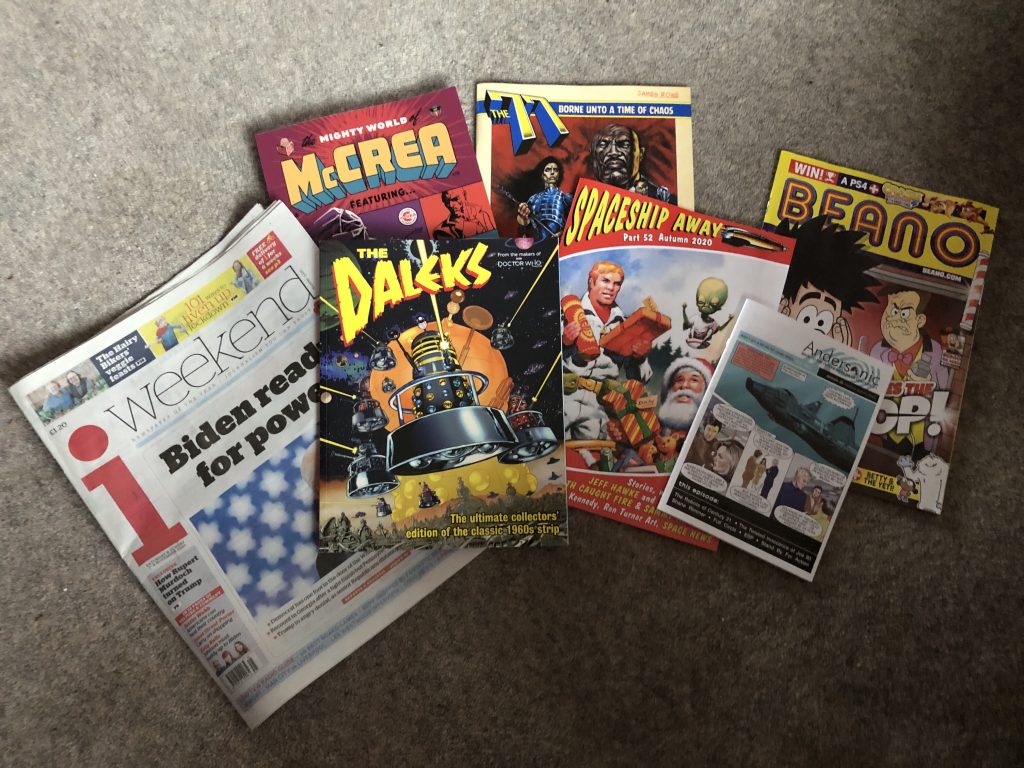
What size is it?
It’s a Bookazine – magazine format.
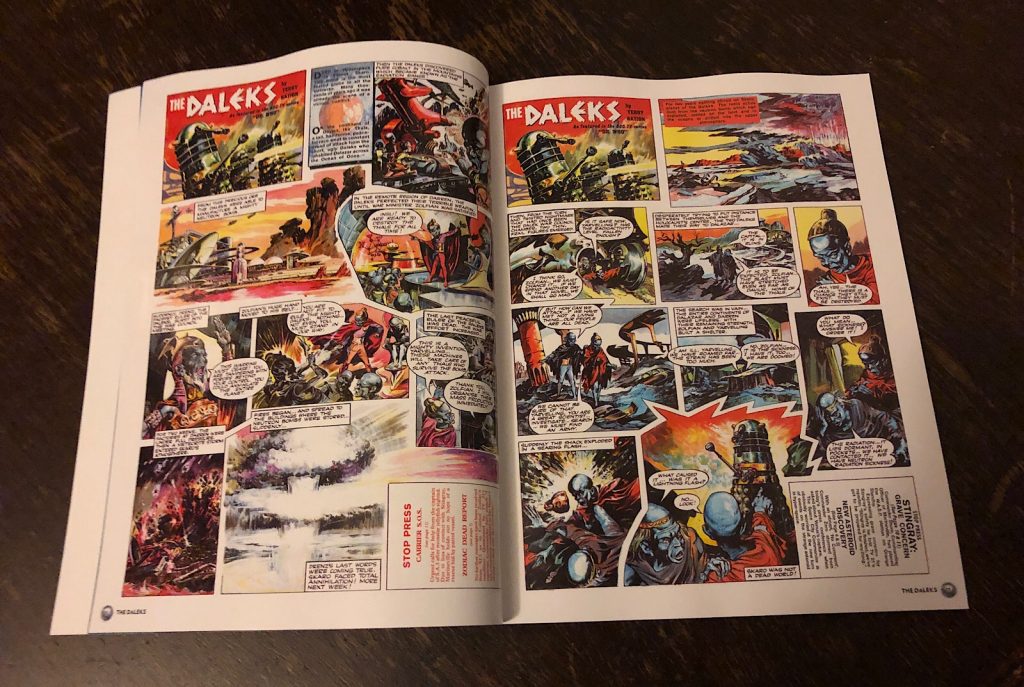
Is The Daleks included in my Doctor Who Magazine subscription?
No, as this is a Bookazine, not a Special. The next DWM Special is out mid December.
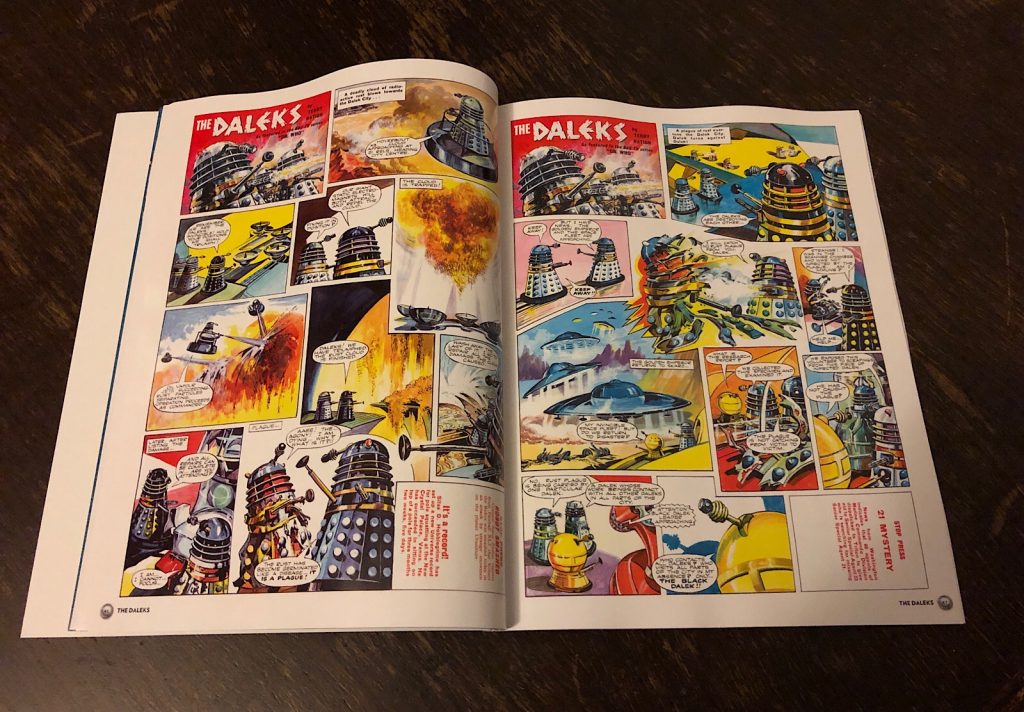
What else is in the Bookazine?
Also included are a feature on the origins of “The Daleks” strip for TV Century 21, written by Marcus Hearn, and an extended interview with artist Ron Turner; and a one page feature on the restoration work carried out to reproduce the strips, sourced from original art boards and pages of TV Century 21 by Peri Godbold.
The Origins of “The Daleks” Story Titles
Paul Scoones, author of The Comic Strip Companion: the Unofficial and Unauthorised Guide to Doctor Who in Comics, notes the 104 episodes of the TV Century 21 strip were simply titled “The Daleks”, with no story titles provided. There were no subtitles or “Next Time” captions to offer a clue as to what these might have been called (if indeed the stories even originally had titles).
The names by which we now commonly refer to the stories can be traced to the late 1970s and 1980. “The Menace of the Monstrons” and “The Rogue Planet” first appeared on reprints in Terry Nation’s Dalek Annuals (1977 and 1978 respectively).
The first three stories (“Genesis of Evil”, “Power Play” and “Duel of the Daleks”) were so named when they were reprinted as “The Dalek Tapes” in Doctor Who Weekly in 1980.
The remaining story titles all appeared in an article by Doctor Who comics historian J. Jeremy Bentham, called “TV Century 21; The Dalek Years” that appeared in a fanzine called Gallifrey in August 1980. Bentham seems to have invented these titles.
(Writer Alan Stevens notes that Jeremy Bentham has said he devised the title “Genesis of Evil”, although admits that Paul Neary coincidentally came up with the same title for “The Dalek Tapes’, prior to being handed a photocopy of Jeremy’s Gallifrey article. “Power Play” also comes from Bentham.
The set of titles was adopted by Jean-Marc Lofficier in 1991’s The Terrestrial Index and was also used in Doctor Who Classic Comics in 1992-93. However, the Jean Marc-Lofficier list is not entirely accurate to the titles Jeremy Bentham devised. For example, Bentham called “The Rogue Planet” “Rogue” as he misremembered the title that has appeared in the 1978 Dalek annual. Furthermore “Eve of War” was rendered “Eve of the War” by Bentham..
• Issues 1-3: Genesis of Evil
• Issues 4-10: Power Play
• Issues 11-17: Duel of the Daleks
• Issues 18-24: The Amaryll Challenge
• Issues 25-32: The Penta Ray Factor
• Issues 33-39: Plague of Death
• Issues 40-46: The Menace of the Monstrons
• Issues 47-51: Eve of War
• Issues 52-58: The Archives of Phryne
• Issues 59-62: The Rogue Planet
• Issues 63-69: Impasse
• Issues 70-75: The Terrorkon Harvest
• Issues 76-85: Legacy of Yesteryear
• Issues 86-89: Shadow of Humanity
• Issues 90-95: The Emissaries of Jevo
• Issues 96-104: The Road to Conflict
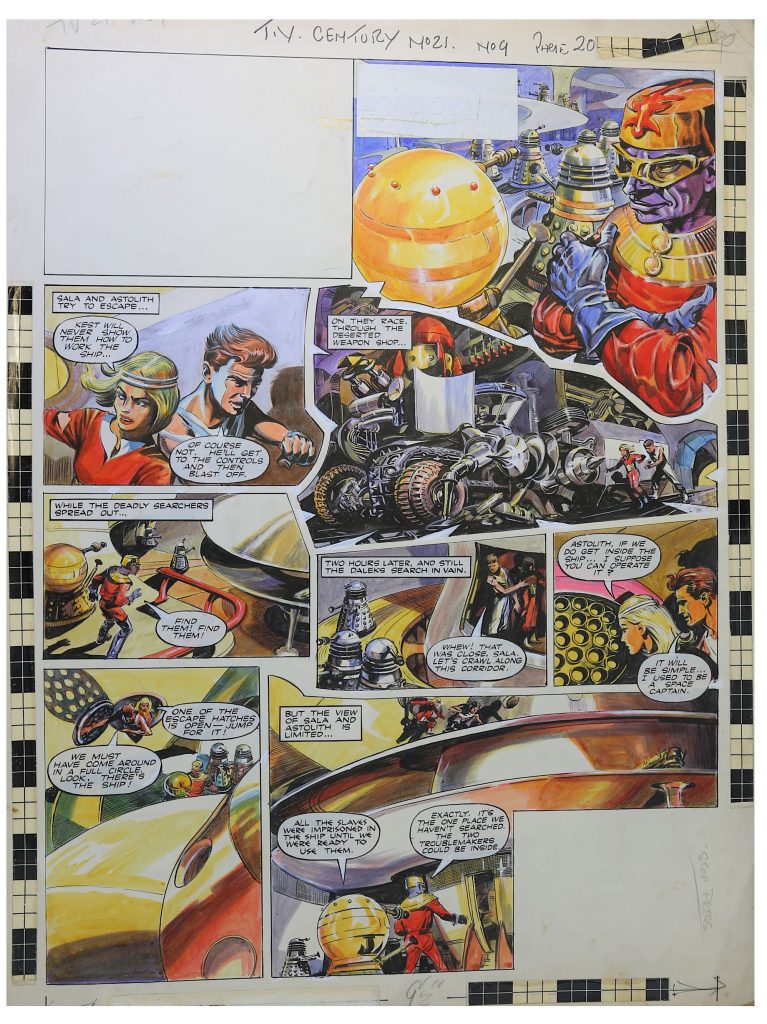
How many pages were reproduced from original boards?
Thanks to the generosity of many comic art collectors and Dalek fans, after an appeal on downthetubes and through various Facebook groups in part championed by myself, John Freeman, about three quarters of the original art boards were utilised in the making of this book. Some art eluded the editorial team due to COVID-19 restrictions – for example, a page held by the Cartoon Museum in London – and the vagaries of electronic communication, but given this strip was first published over 50 years ago, that so many boards have survived is remarkable.
Is this collection also available in hardback?
There are no plans for a hardback collection at this time. Official Doctor Who hardback books are at present only published by BBC Books.
Who drew the collection cover?
The art is by Doctor Who comic artist and TV series storyboard artist Mike Collins. “I kinda went over the top on it,” he admits, “because dammit, a project like that? You just gotta!”
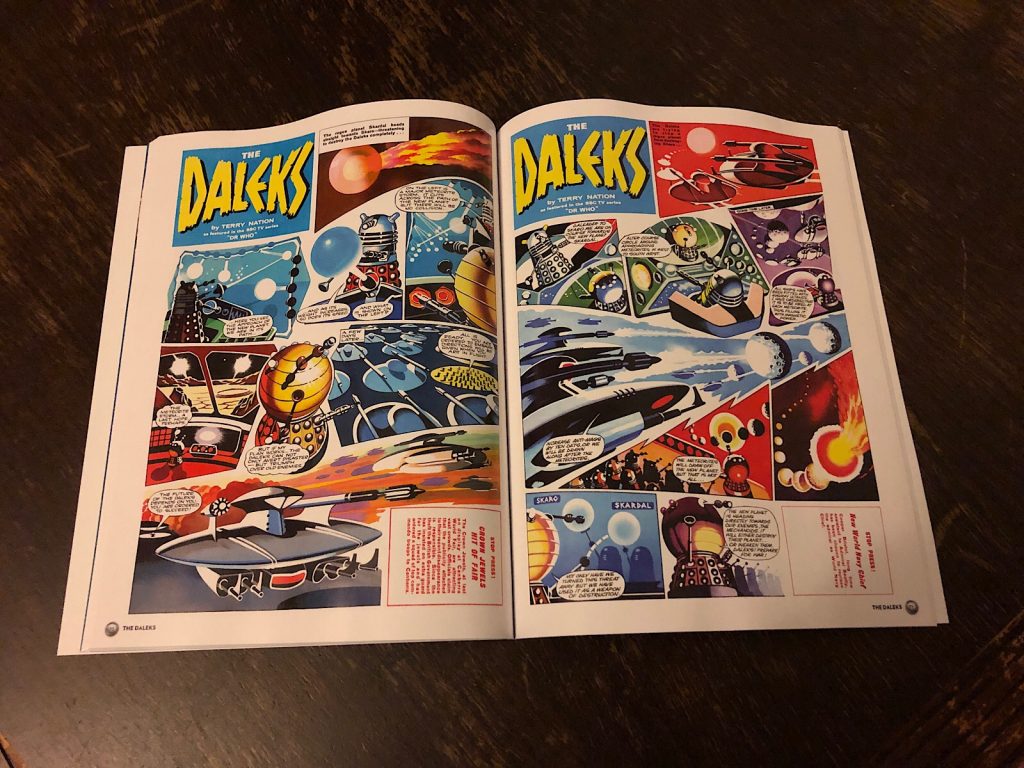
Who owns “The Daleks” strip?
Rights are complex. The original strip was produced in association with Daleks creator Terry Nation whose estate owns the Daleks 50/50 with the BBC as part of informal agreement, so a joint agreement to publish the strips is required.
In addition, the TV Century 21 brand is owned by Rebellion Publishing Ltd., publishers of 2000AD, necessitating their permits feature any TV Century 21 elements in any reprint. (If you’re curious about who owns what British classic comic characters, check out this page on downthetubes).
Are there any plans to reprint the Dalek annual comic strips, stories and other material?
Not that we are aware of at this time, although the search for “The Daleks” boards has unearthed some surviving art for those, too.
Are there any plans for a continuation of “The Daleks”, as proposed by John Freeman in the 1990s?
This writer welcomes approaches from genuinely interested publishers!
• The Daleks is on sale at WH Smith, selected supermarkets and online at store.panini.co.uk from Wednesday 11th November priced £9.99 (UK) | ISBN 9781846532771 | Direct Link
• You can order The Daleks from ForbiddenPlanet.com here – on sale in store from 18th November 2020 (Affiliate Link)
• Online single issue and subscription site Newsstand offers The Daleks Bookazine here – but as of Saturday 14th November 2020, note the “Request this issue” button, suggesting they too might be out of stock
• It’s also available as a digital edition, priced £8.99, from pocketmags.com
• Diamond will be carrying The Daleks for US Who fans. The US cover price is $19.99
With thanks to Paul Scoones for his notes on story titles and additional information on other aspects of the strip’s creation from Jeremy Bentham, Alan Stevens and Richard Whitaker made in comments below. Please note comments close automatically 14 days after initial publication
This article was last updated on 18th November 2020 to reflect comments made as to the authorship of the strip
The founder of downthetubes, which he established in 1998. John works as a comics and magazine editor, writer, and on promotional work for the Lakes International Comic Art Festival. He is currently editor of Star Trek Explorer, published by Titan – his third tour of duty on the title originally titled Star Trek Magazine.
Working in British comics publishing since the 1980s, his credits include editor of titles such as Doctor Who Magazine, Babylon 5 Magazine, and more. He also edited the comics anthology STRIP Magazine and edited several audio comics for ROK Comics. He has also edited several comic collections, including volumes of “Charley’s War” and “Dan Dare”.
He’s the writer of “Pilgrim: Secrets and Lies” for B7 Comics; “Crucible”, a creator-owned project with 2000AD artist Smuzz; and “Death Duty” and “Skow Dogs” with Dave Hailwood.
Categories: British Comics, British Comics - Collections, Doctor Who, downthetubes Comics News, downthetubes News, Other Worlds
 Panini teases Doctor Who “back up strips” collection
Panini teases Doctor Who “back up strips” collection  Doctor Who: Liberation of the Daleks comic collection set to materialise 23rd November – A Preview
Doctor Who: Liberation of the Daleks comic collection set to materialise 23rd November – A Preview  Anthony Lamb’s cover art for “Cybermen: The Ultimate Comic Strip Collection” revealed, print offered for direct orders
Anthony Lamb’s cover art for “Cybermen: The Ultimate Comic Strip Collection” revealed, print offered for direct orders  Doctor Who – The Fourth Doctor Anthology comics collection cover revealed
Doctor Who – The Fourth Doctor Anthology comics collection cover revealed
On page 548 of The Comic Strip Companion (1964-1979) by Paul Scoones, it says, in relation to the Dalek Outer Space Book, “Unlike the previous two books, David Whitaker had no credited involvement in this one. Whitaker had parted company with Nation in late 1965.”
Also:
Vworp Vworp! Issue 3. Page 97 features an interview by Colin Brockhurst with Paul Fishman, son of Jack Fishman, who came up with the idea in 1964 of publishing books about the Daleks.
Paul says “After a bit of shouting I saw Whitaker running out of the house holding his nose and Jack explained it was due to a disagreement with Terry, which he resolved by hitting him. Whitaker did not return.”
Brockhurst asks “When did this happen?”
Paul replies:
“I do not have a date, but I’m almost certain Whitaker was no longer involved before The Dalek World was published, even though he was credited. I believe that originally Whitaker had submitted stories and was paid in advance for work he provided for the first book, however, there were quite a few additional ones that were not originally used and therefore ended up in The Dalek World. The fight between Whitaker definitely happened before The Dalek World was completed and published.”
Now, according to The Comic Strip Companion The Dalek World was published on Friday 1st October 1965 (see page 540).
Paul Scoones is an admirable, resourceful and dedicated researcher, but although he accepts that Nation was closely involved with the writing of the 1970s Dalek annuals (as names like “Joel” and “Rebecca” appear, as well as “notably Tranter, Crayford, Carlson and Tarrant” he nevertheless states that although “the three 1960s annuals were jointly credited to Nation and another writer — David Whitaker for the first two and Brad Aston for the third… it is believed that Nation left most if not all of the writing of these books to his co-authors” (page 557).
However, on page 98 of Vwrop Vworp! issue 3, in another Brockhurst interview, Brad Ashton states:
“Terry was ill that year and talked me into doing the Daleks book, even though I had never watched a Daleks episode on TV. I wrote two-thirds of the book and Terry himself wrote the other third.”
However, if Aston was, by his own admission, unfamiliar with the Daleks; and by extension also Sara Kingdom, then I think it is safe to assume that all the material featuring these characters were written by Nation, and the none Dalek science fiction stories were penned by Aston. Consequently, it would appear it was Nation who wrote two thirds and the book with the remaining third by Aston.
Finally, as I point out in the closing paragraph of my article for Vworp Vworp! on the 1960s Dalek annuals (Dalek History, Past and Present):
“Jack Fishman… became a friend of Terry Nation and worked with him to develop the proposal before approaching Souvenir Press Ltd. Fishman was an accomplished journalist in his own right, as well as authoring The Private Life of Josif Stalin (1962) and My Darling Clementine (1963), a biography of Winston Churchill’s wife, he had a keen interest in intelligence work and played a major role in unmasking the notorious Soviet double agent Kim Philby, who then fled to Moscow in 1963. Consequently, much of the emphasis in the Dalek annuals on the Cold War and the political and military situations of World War Two, particularly in regard to the Eastern Front, must be credited to Nation and Fishman’s close association.” (See page 99).
As it stands, there is not a shred of evidence to support the notion that David Whitaker wrote, in their entirety, the first two Dalek annuals, or that the TV Century 21 The Daleks strip “was largely written by Doctor Who’s first story editor David Whitaker.” Indeed, If Nation and Whitaker fell out prior to 1st October 1965, then it may well be the case that Whitaker’s involvement with The Daleks Strip ended with Plague of Death (4th September/16th October 1965), leaving ten stories where Whitaker was absent.
In fact, I’d go further, and claim that The Pentaray Factor (10 July – 28 August 1965) should also be credited to Nation, as it appears in Terry Nation’s Dalek Annual 1977.
Finally, you state “Alan Fennell told author Simon Archer that he worked alongside Terry Nation at the beginning, so can be considered co-writer”, however, if you take a look at the latest Doctor Who Magazine you’ll find an article by Simon Guerrier that disputes this, by pointing out that the origins of Genesis of Evil can be found in The Dalek Book, and he’s quite right!
In my article for Vworp Vworp! Issue 3 on the TV Century 21 comic strips (Genius of the Daleks”), I state on page 74:
“The biggest influence on the Dalek comic strip actually came from the The Dalek Book (published 30 September 1964), with many of its ideas cherry-picked for inclusion, and not just the Golden Dalek Emperor, or Oquolloquox (a violent gale that occurs every six years on the planet Skaro), or the Dalek word “insli” (meaning “It is ready”), or the two headed Horrorkons (although in this instance being relocated from the planet Gurnian to Skaro’s own Lake of Mutations and renamed “Terrorkons”), but also Drenz, Zolfian and Yarveling (sic).
Drenz is described in “The Dalek Dictionary” as “the last peaceful leader of the race of Daleks,” who was then “killed by his own people in the year 2003.” Zolfian is said to be “a legendary hero among all Daleks” belonging “to Skaroian myths and legend” and also seen as “a Dalek who triumphed in war and was popular in peace.” Yarvelling, on the other hand, is portrayed as “a famous Dalek inventor, discoverer and explorer” and to have been “the first Dalek to travel beyond Skaro and bring back from Fildor a quantity of its precious gold metal.”
Personally, I also don’t see why Nation and Whitaker (as there is no disputing that the latter did work in some capacity on the early strips) would require the help of Alan Fennell at all, beyond the purely advisory. I mean not only had they scripted perfectly acceptable comic strips for The Dalek Book, the idea that the Daleks’ ancestors were at war with the Thals and that this resulted in the planet Skaro being irradiated by neutron bombs evidently comes from the first Dalek serial!
Much as I appreciate this extensive note, I would caution against dismissing Alan Fennell’s involvement in the shaping of “The Daleks” in its early days.
Fennell, like many other comic editors, was clearly very much “hands on” in terms of his work on TV Century 21, and ensuing publications.
As for your last point as regards storylines in the strip drawing on the first Daleks TV story, both Nation and Whitaker were involved in that. As story editor, his involvement in all aspects of the show was wide ranging, and far more arduous than a script editor’s duties today.
I’m hesitant to completely dismiss Whitaker’s role as the key writer of “The Daleks” until such time as substantive paperwork might be unearthed, perhaps in the BBC archive. Surely Terry Nation would have been unlikely not to have stated somewhere his role as a substantial writer of the strip if presented the opportunity?
There is no doubting Whitaker’s involvement in some other spin-off material, particularly the first Doctor Who novel, and, potentially, he may well have been earmarked to return as a novelist during the Target years, as noted here on Notes and Queries, had he sadly not died in 1980, at a relatively young age.
Sadly, the lack of credit for writers and artists in many British comics of old provides a fertile ground for speculation. We may never know the real answer.
I very much appreciate the research and references provided, Alan, very lacking in discussion elsewhere!
I’ve had an email from Jeremy Bentham, who has kindly given me permission to post his thoughts here on the authorship of “The Daleks”…
“I’d be amazed if Terry Nation didn’t have some involvement with the comic strips in TV 21, other than just collecting the money, but he was known as quite a “lazy beggar”: very happy to have the grand ideas, but happy to let others subsequently work out the details and do most of the donkey-work.
“Terry certainly didn’t do anything in the way of sign-off or approval to the scripts. John Peel – who knew Terry quite well towards the end of his days – asserts that one aspect of the strip he didn’t like was the gold Emperor. He refused permission for an Emperor Dalek to appear in the TV series while Eric Saward was Script Editor, felling that ‘thinking role’ should always go to Davros. Hence the muddy compromise in Remembrance of the Daleks.
“David Whitaker was more certainly the strip’s principal script writer. Alan Fennell confirmed that on many occasions. And while I was researching Doctor Who: The Early Years, I spoke frequently with Whitaker’s second wife, June Barry, who mentioned David would sometimes finish his story scripts at weekends if he’d not been able to complete a submission in his office at Associated London Scripts. (Around 1984, it was still June who had a lot of David’s paperwork. It was she who unearthed David’s draft scripts for The Power of the Daleks that were subsequently copied so that John Peel could have a set when writing his Target novelisation of the serial).
“Sadly, to the best of my knowledge, nobody in fandom ever met or interviewed Whitaker before his all-too-early demise. The closest was Gary Hopkins, who briefly exchanged some correspondence with him following his return to the UK in the late 1970s. From memory, I think he and Gary mulled over some new ideas for Doctor Who, but never touched on much to do with the past. That’s probably because none of us knew how frail Whitaker’s health was at that point.”
Comic artist Richard Whitaker, David’s nephew, tells me that after his father’s death he went through what was left at his flat but didn’t find anything of great significance. “A few bits and bobs, photos in the deed box but nothing that would help [as regards credits]. I went through what was left of [my brother] Steve’s papers too but it was just random notes, scribbles etc.” (Comics artist and colourist Steve Whitaker died suddenly in 2008).
“David returned from Australia shortly before he became ill,” Richard recalls, also noting David wrote ‘The Daleks’ comic strip, as well as other Who tie-ins. “I think he spent a year or so in London with his wife, Stephanie. From what Steve told me at the time he was shocked at how poor they were. I suspect David already knew he was ill and this was why he returned to see my dad before he died. He visited us in Bedford with Stephanie who was lovely. Tragically, she also died young after returning to Australia from cancer.
“There remain mysteries and everyone involved has died, I’m afraid. David has received some acknowledgement in recent years though for his early work.”
Thank you for the citation of my ‘Notes and Queries’ article, John. I’ve now updated the articie to correct the date of the falling-out reported by Paul Fishman, which as Alan Stevens pointed out should be 1965 rather than 1967. As someone whose own memories of editing in my own area can be at variance with detailed evidence on specific points, while not contradicting the fact that I sometimes undertook major overhauls of work either on my own account or in close co-operation with an author, I’d agree that Alan Fennell’s recollections are likely to be broadly true, although editing the Dalek strip was a small part of a substantial editing and writing career in comics and elsewhere.
According to Simon Guerrier’s article in the current DWM, Alan Fennell told Gerry Anderson’s biographer Simon Archer, “I scripted the history of the Daleks, because he’d never done it. We didn’t know where they came from. The initial story, telling how the Daleks came into being was something I developed with him. And then a writer called David Whitaker took over.”
So Fennell is saying he developed the history of the Daleks with Nation, not Whitaker!
Consequently, if we accept Fennell’s statement as factually correct, then it means Whitaker was not involved in the initial shaping of the comic strip. In fact, during another interview conducted with Alan Woollcome on 29th January 1993, Fennell said “I think I probably outlined the first two or three [plots], which is basically how it all began”, thus knocking Whitaker out of the set-up entirely.
Only it doesn’t, because in the same interview Fennell goes on to says “There was a lot of input from my side because I wanted to do it in the first place. I was very involved in it because I spent a lot of time in David Whitaker’s mews flat doing it. I remember it was always after work and I was always late home! David then took over.”
So in one interview Fennell is saying he worked closely on developing the strip with Nation, and in the other it’s Whitaker, which Paul Scoones interprets on page 485 of his excellent book, as all three writers being involved in the development of the first script, although Fennell doesn’t actually say that, and instead is simply contradicting himself.
Now, if we look at the substance of what Fennell is saying, then there is once more an issue, because we know for a fact that Nation scripted the history of the Daleks for their first TV serial, as it appears in his original twenty-six page story outline titled “The Survivors”, that Nation submitted to the Doctor Who production office, and which was published as chapter seven of John Peel & Terry Nation’s The Official Doctor Who and the Daleks Book back in 1988.
This drives a Mark 2 Travel Machine straight through the middle of Fennell’s assertion that he “scripted the history of the Daleks, because [Nation had] never done it. We didn’t know where they came from.”
You say that “Fennell, like many other comic editors, was clearly very much ‘hands on’ in terms of his work on TV Century 21,” and yet were does this information come from?
Alan Fennell!!! So again, it’s not something that we can put too much weight upon.
As for Fennell’s statement that he “spent a lot of time in David Whitaker’s mews flat doing it. I remember it was always after work and I was always late home!”, this is directly contradicted by Whitaker’s second wife, June Barry, who, according to Bentham, “mentioned David would *sometimes* finish his story scripts at weekends if he’d not been able to complete a submission *in his office at Associated London Scripts*.”
As a matter of interest, at that timeTerry Nation himself had a flat at 14 Ambassador House, Carlton Hill, London, N.W.8.
So is it possible that Fennell really did work on those early strips, but has confused Whitaker with Nation, or was Fennell simply throwing in some half remembered fact with the hope that it would lend his story some verisimilitude?
Who can say?
In regard to Whitaker’s “plans to novelise certain Dalek stories” sometime around 1980, this cannot be used to invalidate Paul Fishman’s claim that Whitaker and Nation fell out in 1965.
It’s perfectly possible that they squabbled and then became friends again sometime later, or that Whitaker was simply expressing a desire to novelise his two Dalek serials, and WH Allen had yet to broach the subject with Nation. As I seem to recall, Whitaker was only contracted to write The Enemy of the World.
There does appear to have been some low level animosity from Nation towards Whitaker, not only concerning the Golden Emperor of the Daleks, but also in regards to the novelising of “Power” and “Evil”. Certainly at the time, the impression given by Nigel Robinson was that Nation was blocking their release as Target books, and it was only though the intervention of Nation’s close friend, John Peel, that things moved forward. Perhaps someone should drop Peel a line, or Robinson, to get the inside scoop?
In conclusion: it cannot be said with any certainty that ‘The Daleks was… largely written by Doctor Who’s first story editor David Whitaker”, and it would stand to reason that if Nation’s agent had negotiated a higher than normal rate to write The Daleks comic strip, then Nation would have done it himself and not given the money away to David Whitaker.
Alternatively, if Nation and Whitaker had split the fee, then this would mean that the latter was writing, uncredited, a weekly comic strip for two whole years, of which he would have been paid less then the average going rate, even though Nation was more than willing to pay Angus P. Allan, unbidden, the whole rate when he filled in for a few weeks. There is certainly no evidence to suggest that Whitaker was being paid directly by City Magazines for his alledged work on The Daleks.
As it stands, the more likely scenario is that Nation wrote the scripts for The Daleks with Whitaker occasionally fill in for him, in the same way that Angus P. Allan says he himself covered for Nation, presumably after Nation and Whitaker, for whatever reason, were no longer working together.
Equally, it could be that Whitaker’s involvement with The Daleks strip is a fan myth (prompted by another fan myth that Nation was a “lazy bugger”) that later went on to contaminate the memories of Alan Fennell, June Barry and god knows who else.
This could be argued back and forth ad infinitum but to respond specifically to your comment dismissing the amount of work Alan Fennell put into his projects, this is my assertion, not his, based on direct experience of doing a similar job – and he was doing TV21 weekly, week in, week out. Quite frankly, unless you’ve done the job of weekly comic, you have no idea how all consuming it is, so please don’t demean your argument by belittling the role.
My reply above was based on your earlier post, which, if I’m not mistaken, you have updated with a very useful link to the Celestial Toyroom article. Of particular interest is this:
“The history of W.H. Allen’s negotiations with Terry Nation is only known through fragments, but it seems possible, from what we know of the wider context, that had there been more Doctor Who books from David Whitaker, they would not have included his Dalek stories. Alwyn Turner’s Terry Nation The Man Who Invented the Daleks (2013) mentions that Nation and Whitaker supposedly had a quarrel in 1967, and Simon Guerrier in The Black Archive #11: The Evil of the Daleks (2017) presents reasons why Whitaker, as the man who commissioned and developed Terry Nation’s first two Dalek serials for Doctor Who, and much else, might have fallen out with Nation. Later in the 1980s, Eric Saward could not accept Nation’s agent’s financial demands concerning the proposed novelizations of Resurrection of the Daleks and Resurrection of the Daleks, which remain unpublished. W.H. Allen’s renewed emphasis on certainty of profitability following its restructuring in 1979/80 might also have added some rigidity.
So, there is no certainty that Whitaker would have taken over the Power and Evil novelizations relinquished by Terrance Dicks. In the event, they appeared, in forms much longer than the standard Target format (described by Whitaker as 39,000 words), in 1993, written (like The Chase and the two-volume Daleks’ Master Plan) by John Peel.”
So Dicks was originally meant to novelise “Power” and “Evil” not Whitaker. In fact, beyond fan speculation, their is no mention of Whitaker doing “Evil” and “Power” at all.
I will be correcting my ‘Notes and Queries’ article very shortly to change the date of the supposed Whitaker-Nation falling out, based on information provided by Alan.
Please do not misrepresent my argument.
The only Alan Fennell project my posts refer to is his involvement with the TV Century 21 The Daleks comic strip, which in the grand scheme of things, would have constituted only a small fraction of his output.